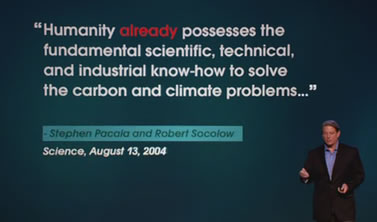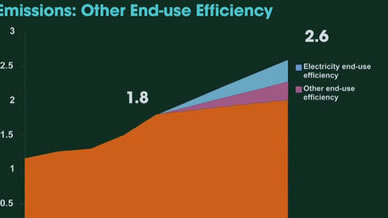Al Gore "An Inconvenient Truth"

Al Gore "An Inconvenient Truth" |
 |
Part 7 (1:21:00 - 1:28:26) |
|
Economy vs. Environment Let me give you an example of the wrong way to balance the economy and the environment. One part of this issue involves automobiles. Japan has mileage standards up here. Europe plans to pass Japan. Our allies in Australia and Canada are leaving us behind. Here’s where we are. There is a reason for it. They say that we can’t protect the environment too much without threatening the economy and threatening the auto makers, because auto makers in China might come in and just steal all our market. Well, here is where China’s auto mileage standards are now. We can’t sell our cars in China today because we don’t meet China’s environmental standards. |
 |
 |
California has taken some initiative to have higher mileage cars sold in California. The auto companies have sued California to prevent this law from taking effect, because, as they point out, eleven years from now this would mean California would have to have cars for sale that are as efficient eleven years from now as China’s are today: clearly too onerous a provision to comply with. Is this helping our companies to succeed? Actually, if you look at who’s doing well in the world, it’s the companies that are building more efficient cars. Our companies are in deep trouble. |
Too big a problem? Final misconception: If we accept that this problem is real, maybe it is just too big to do anything about. There are a lot of people who go straight from denial to despair without pausing on the intermediate step of actually doing something about the problem. And that’s what I would like to finish with: the fact that we already know everything we need to know to effectively address this problem.
|
 |
 |
We’ve got to do a lot of things, not just one. By increasing end use efficiency we can remove global warming pollution that would otherwise be put into the atmosphere.
They all add up and pretty soon we are below our 1970 emissions. We have everything we need, save perhaps political will. In America, political will is a renewable resource. We have the ability to do this. Each one of us is a cause of global warming, but each of us can make choices to change that with the things we buy, with the electricity we use, the cars we drive. We can make choices to bring our individual carbon emissions to zero. The solutions are in our hands. We just have to have the determination to make them happen. |
 |
 |
Are we going to be left behind as the rest of the world moves forward? All of these nations have ratified Kyoto (WIKIPEDIA). There are only two advanced nations in the world that have not ratified Kyoto and we are one of them. The other is Australia. Luckily, several states are taking the initiative. The nine northeastern states have banded together on reducing CO2. California and Oregon are taking the initiative. Pennsylvania is exercising leadership on solar power and wind power. US cities are stepping up to the plate. One after the other, we have seen all these cities pledge to take on global warming. |
Rising to the Occasion So, what about the rest of us? Ultimately this question comes down to this: Are we as Americans capable of doing great things even though they are difficult? Are we capable of rising above ourselves and above history? The record indicates that we do have that capacity. We formed a nation. We fought a revolution and brought something new to this Earth, a free nation guaranteeing individual liberty. America made a moral decision that slavery was wrong and that we could not be half free and half slave. We as Americans decided that of course women should have the right to vote. We defeated totalitarianism and won a war in the Pacific and the Atlantic simultaneously. We desegregated our schools and we cured fearsome diseases like polio. We landed on the moon, the very example of what’s possible when we are at our best. We worked together in a completely bipartisan way to bring down communism. We have even solved a global environmental crisis before, the hole in the stratospheric ozone layer. This was said to be an impossible problem to solve because it’s a global environmental challenge requiring cooperation from every nation in the world. But we took it on, and the United States took the lead in phasing out the chemicals that caused that problem. So now we have to use our political processes in our democracy and then decide to act together to solve those problems. But we have to have a different perspective on this one. It is different from any problem we have faced before. Our Only Home
|
|